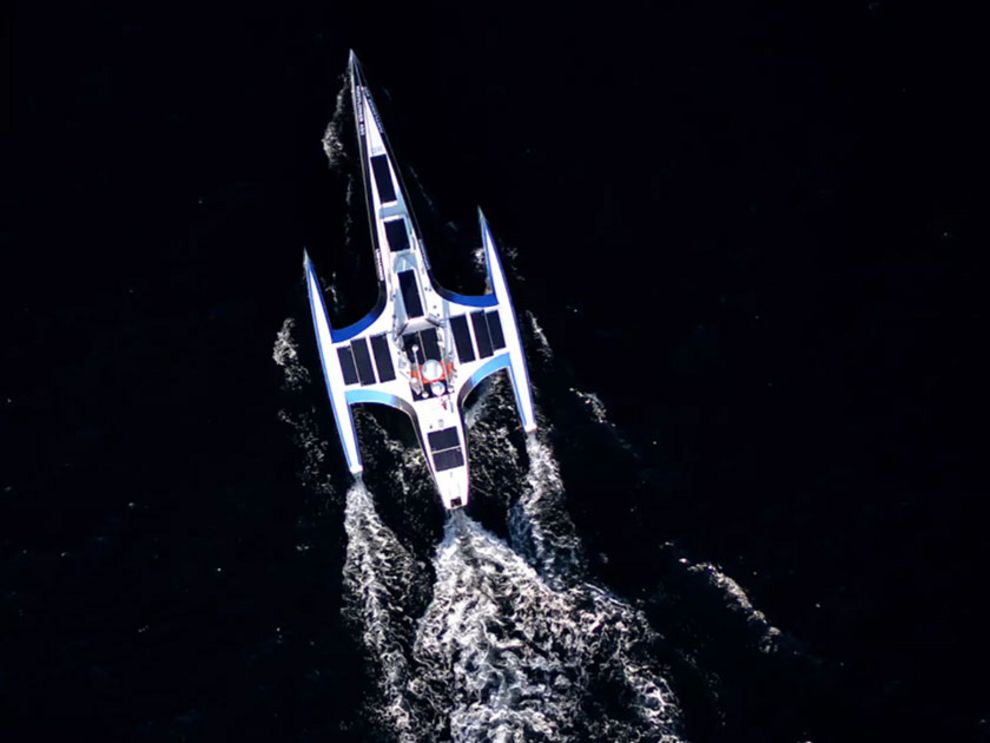Sun, Sea, and Artificial Intelligence: The Mayflower is on the Move (Again)
The new Mayflower, also known as MAS400, is to sail from Great Britain to America without a captain or crew - 5200 kilometers across the temperamental North Atlantic, from England to the east coast of the USA. With this project, IBM, together with the marine research organization ProMare and other companies, wants to demonstrate what artificial intelligence can achieve today. The vessel, packed with cognitive computer technology from IBM, is now successfully under way.
#IBM #Artificial Intelligence
Mayflower autonomous ship (MAS) had already set out on her journey on June 15, 2021 - in the footsteps of the Pilgrim Fathers who embarked 400 years earlier on the sailing ship Mayflower to the New World[i]. However, the first voyage of the modern Mayflower lasted just two days. On the evening of June 17, 2021, the ship experienced a problem that resulted in loss of power and speed. After a remote diagnosis, ProMare's support team determined that it was likely a mechanical problem with the ship's generator that could not be fixed without human intervention. In fact, upon returning to base, they determined that the problem had been caused by a break in the flexible metal coupling between the ship's generator and the exhaust system. While the MAS400 uses solar panels to draw as much power as possible from the sun, an on-board generator automatically kicks in to recharge the battery when needed. After the coupling broke, the MAS400 had to rely solely on solar power, but the bad weather and rough seas meant that not enough solar energy could be generated to continue the voyage.
Automation, AI and edge computing
Almost a year later, MAS400 is underway again, even better prepared and ready for the journey from Europe to America. The modern Mayflower is a ship with three hulls that travels across the ocean with a combination of wind turbines, diesel, and solar energy. The vessel was designed to be completely self-sufficient (as long as nothing goes wrong). Operators can send messages to the ship, to be sure. But if they don't arrive, the on-board computers perform their programmed and learned tasks all by themselves.
Unlike the year 1620, the Atlantic crossing, which is now underway again, can be followed worldwide via the Internet - with live video, maps and streaming data[ii]. The project uses IBM's automation, AI, and edge computing technologies to constantly evaluate its condition, environment, and mission and make decisions while at sea. The voyage is expected to last about three weeks.
Like a starship enterprise transport ship
MAS is a very impressive vehicle[iii]. Looking like a starship-enterprise feeder ship, the vessel weighs five tons and is 15 meters long. She features a highly stable aluminum trimaran hull and is powered by a solar-powered, hybrid-electric propulsion system. The ship can achieve 8 knots (15 km/h). That may seem slow, but it's still much faster than the original Mayflower, which is believed to have averaged less than 4 mph.
For geographic and meteorological decision support, MAS is equipped with precision inertial navigation, Global Navigation Satellite System (GNSS) positioning, radar sensors, satellite communications and meteorological instrumentation. The facilities also monitor emerging weather - using forecast data from IBM's own Weather Company[iv]. What's missing, on the ship, are bunks and galleys for captain and crew. Instead, there are racks for the cognitive computer technology from IBM that steers the ship.
The «AI Captain» has been learning for years
The brain that gives MAS the ability to operate without human intervention is called "AI Captain" by the team. This virtual AI captain has undergone years of training to acquire the necessary knowledge. Using inference algorithms and models generated with IBM's Visual Insights computer vision technology, the captain learned to recognize ships, debris, bridges, pieces of land, floating shipping containers with the help of more than a million nautical images. To do this job, MAS400 can see 2.5 nautical miles (4.6 kilometers) ahead.
For marine research, MAS400 has an electric "tongue" that "tastes" the ocean's chemistry and captures information about organic material and microplastic pollution. There are even microphones that can pick up whale songs.
Once the AI captain receives actionable data from onboard cameras, radar, sonar, and other devices that constantly scan the ship's environment, he turns to IBM's automated rules management system, IBM Operational Decision Manager (ODM), to follow international regulations to prevent collisions at sea. ODM isn't really maritime software at all: it's widely used in the financial services industry to approve loans and personalize customer offers, and it provides a transparent record of decision-making processes to avoid scenarios where it's not clear why a particular decision was made.
Edge computing for on-board data processing
To make decisions without being connected to a computer on shore, MAS uses 15 edge computing devices to process data on board. The decision logic, based on ODM software, runs as an edge workload on the ship. All edge devices are orchestrated by the IBM Edge Application Manager. At sea, MAS' AI captain relies on ODM recommendations as well as up-to-date forecasts from The Weather Company to continuously evaluate options, avoid hazards, and make navigational decisions. A Safety Manager function running on Red Hat Enterprise Linux supports the AI Captain's decisions.
As for the hardware on MAS, a wide variety of computers are used: in addition to IBM Power Systems AC922 servers specialized for AI, there are NVIDIA Jetson modules , which specialize in autonomous machines, AI and edge computing - with the lowest power consumption - as well as Intel-based computers and additional purpose-built computers.
A harbinger of the future
The autonomous ship Mayflower is a harbinger of the future. Piloted by an AI captain and powered by IBM Automation, the ship will demonstrate the extent to which AI is already enabling autonomous shipping. This will have a huge long-term impact on shipping in general, global merchant shipping, and even countless other industries.
UMB is the only IBM partner in Switzerland with Elite Specialty status for IBM Power and Storage in Switzerland. Above-average know-how regarding IBM hardware as well as software and services guarantee excellent cooperation. Contact us for additional information.
[i] IBM News Room - Mayflower Then and Now
[ii] Mayflower Autonomous Ship (mas400.com)
[iii] Sea change — setting a new course for ocean research
[iv] The Weather Company, an IBM Business | Accurate Weather Technology & Data



